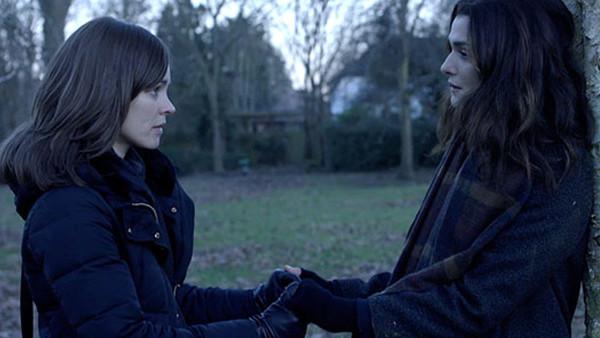Disobedience Review: Congregated Coitus
The death of a Rabbi father leads to a rising conflict between devout religion and lustful desire.

Rabbi Rav Krushka is a beloved leader in his Orthodox community, but a strong religious community is dealt a heavy blow after Rav stumbles during one of his sermons and perishes shortly thereafter. The news travels to his estranged daughter, a Manhattan art photographer named Ronit Krushka (Rachel Weisz), who catches the next flight to her father’s Hendon neighborhood located in London. Her arrival is met with the same resentment that she received when she left years ago, but she is greeted by her childhood friend and closest disciple and successor to her father Dovid Kuperman (Alessandro Nivola). Ronit soon discovers that Dovid married Ronit’s former best friend Esti (Rachel McAdams). Ronit’s relationship with Esti is the key to her leaving, the escalating conflict of Ronit’s continued stay in London, and the reason why she’s finding it so difficult to go back home.
Disobedience is a romantic drama from Chilean director Sebastian Lelio. Lelio directed last year’s foreign film Oscar winner A Fantastic Woman. Disobedience is based on the 2006 novel of the same name by British author Naomi Alderman. It’s a shame that the poster for the film gives away that this is a love story between two women because the way the film unfolds has you continuously asking questions. The romantic drama concentrates on what one goes through with the loss of a loved one. How Ronit mourns before she gets on her flight, whether it’s stumbling around in a daze, drinking until she forgets about her worries, or having sex with a stranger in a public bathroom, it seems to be an illustration of how vulnerable we become with those important to us in our life even if we haven’t been in touch with them in years.
Ronit is not met with a welcome return. Former friends and acquaintances question her arrival while judging her. Some whisper and mumble quietly while huddled in groups just out of earshot while others say exactly what they’re thinking directly to Ronit’s face. Ronit returns home because she wanted her father to know that she loved him even if she couldn’t be a part of the religion he so desperately clutched on to. Disobedience examines how devoted one can be to his or her faith. Dovid has surrounded himself with nothing but people who believe in the same thing that he does. They’re basically yes men who either echo his words back to him or only tell him what he wants to hear. Ronit becomes a catalyst not only for Esti’s past, but also a questioning outside world that is consistently attempting to burst the closely-knit bubble Dovid and his people have surrounded themselves with.
The heart of Disobedience lies within Esti and her feelings toward Ronit. Esti has always had feelings for Ronit and is specifically only attracted to women. Sebastian Lelio explores what it’s like to pretend homosexuality can be cured over time with religion and a forced straight relationship. Religion becomes a compensation for Esti; a distraction from how she really feels. Despite being a firm believer, she’s forced into a life that she didn’t want. Ronit’s return reminds her of who she really is. Disobedience evolves into a struggle about being free in your own skin and not feeling shackled because of those around you.
The performances are crucial of relying on the other actors to propel each and every one of them into the next scene. Rachel Weisz portrays someone that doesn’t fit the standard mold of a Rabbi’s daughter. She’s distanced herself from it all and, at times, seems to be the only person thinking rationally. In a way, Dovid’s congregation is like a hive mind and Ronit is more of a trendsetter who marches to the beat of her own drum. Rachel McAdams seems lost as Esti. Her portrayal and acting are both powerful, but the character seems to go somewhere else whenever she’s not with Ronit. There’s an obvious spark between the two actresses; an intimacy that isn’t felt between Rachel McAdams and Alessandro Nivola.
Weisz and McAdams are passionate, lustful, and amorous together. Their love scenes aren’t entirely erotic, but more of a display of how these two characters truly feel about one another. There’s a taboo aspect to it, a risk of being caught, and a blossoming paranoia of destroying the sham of a life at least one of these ladies has pretended to have for so long and all that factors into their performances. The sex becomes a way of coping just as much as it is an act of two women making love to each other
Disobedience opens with a slow burn, but continues to snowball into an intriguing film about a forbidden topic and then explodes with an unsuspected amount of meaning while taking an incredibly bold stance of choosing your sexuality over religion or vice versa. The complex performances of Rachel Weisz and Rachel McAdams are mesmerizing and unforgettable. There are some compelling statements made about difficult subjects and life choices in Disobedience and writer and director Sebastian Lelio allows the audience to feel what these broken characters feel and experience just how difficult it is for them to try to piece it all back together again with or without the crutch they’ve spent their whole life leaning on.
Disobedience is now playing in US theatres and hits UK cinemas on November 30th, 2018